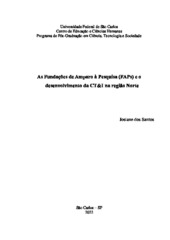As Fundações de Amparo à Pesquisa (FAPs) e o desenvolvimento da CT&I na região Norte
Abstract
The state funding agencies, the Research Support Foundations (FAPs, abbreviation in portuguese) are institutions of financial support for regional scientific research, collaborae with the regional scientific system and with the decentralization of resources to science, technology and innovation (ST&I). The implementation of FAPs in the North region is recent, starting in the 2000s, most of them at the end of this decade. In Amazonas and Pará, FAPs were instituted in 2003 and 2007, respectively. In the other states of the North region, between 2009 - some operating from 2013 - and 2022, the state agency funding ST&I in Roraima, the last FAP created in Brazil. The FAPs make available, among their actions, the funding programs to support regional ST&I. This research investigates how FAPs act in the region and how their funding programs encourage local scientific development. The study describes and analyses the administrative characteristics, the management models and the interests (explicit or not) of the state funding agencies of the North region, these items direct the formulation and purposes of its ST&I promotion programs. It also analyzes the characteristics and purposes of these development programs. The fostering programs analyzed refer to edicts published at three moments: in the first year of operation of each FAP; in 2015; and in 2019. They are framed into four lines of promotion: human resource training (masters and doctors) and institutional support to post-graduate programs; strengthening of research institutions (infrastructure and personnel); research networks in the region; and regional themes. The institutional situation of some FAPs remains almost unchanged in comparison with the beginning of their activities and the current moment: insufficient staff to meet the institutional demands; consecutive budget cuts; and state government measures that interfere with management and operation. The FAPs of Amazonas and Pará have more institutional strength compared to the others, they are also the states with more scientific institutions, i.e. greater representation of the scientific community. The FAPs, as well as decentralisation, have as their objectives the collaboration in the construction of the local scientific agenda. In this sense, research agendas are constructed through dialogues with local scientific actors - represented by the members of the Superior Boards - and the demands of the political actors are designed in the local government plans for the scientific area. As a polysemic word, development has different meanings for each individual, and this is the challenge when promoting it: to conciliate collective interests.
Collections
The following license files are associated with this item:

